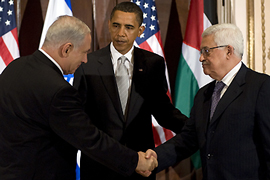Netanyahu’s ‘yes we can’ moment
Without serious pressure on Israel, US envoys are wasting their time, says analyst.

 |
| Obama (centre) hosted talks in September with Netanyahu (left) and Abbas in New York [EPA] |
Big speeches with grand accompanying events marking an ‘umpteenth’ rekindling of the strangest and longest peace process have been Middle East fixtures for decades, as have the inevitable follow-up periods of analyses and projections.
No matter where the leaders in question stood on the scale of left to right, or to which party they belonged, little new ever emerged; peace talks had fallen into a vicious cycle of deja vu.
Not this time, however.
If only to recall the US president’s motto of change, and his rallying cry of “yes we can”, credit must be given where credit is due: Obama has accomplished what no other US president before him managed to do.
Despite Israel’s refusal to comply with his demand to freeze settlement expansion – which amounted to a political slap in the face – Obama still hosted a meeting between the Israeli prime minister and the president of the Palestinian Authority (PA).
And he announced, in all seriousness, that “permanent status negotiations must begin, and begin soon”.
Obama ‘humiliated’
| in depth | |||||||||||||
|
For many observers, it beggars belief that the most powerful country in the world could be scorned in this manner by a much smaller one.
Israel itself has depended on US political patronage and financial aid to defy dozens of UN Security Council resolutions and the will of the vast majority of the real international community.
So early in his mandate, having been publicly humiliated by Israel, Obama backtracked and allowed its arrogance to reach new highs.
Having set a precedent, and seemingly gotten away with it, Israel is now unlikely to be pressured – let alone forced – to comply with the will of the international community on any issue.
Indeed, Israel can claim that there is change under Obama, as it now can confidently say “yes we can” as non-diplomatically and defiantly as it wishes.
It may have been unrealistic to expect the US president to be more regal than Mahmoud Abbas, the president of the PA, when the man supposedly defending Palestinian interests – albeit without a legitimate mandate – has ignored Israel’s transgressions.
If Abbas can overlook them and meet with Netanyahu while Gaza continues to starve under siege, why shouldn’t Obama?
Unfortunately, the entire fiasco was predictable, following the complete failure of the president’s special envoy, George Mitchell, to achieve anything during several months of selective diplomacy.
For all the contrived hype surrounding Obama’s hesitant engagement, the so-called high stakes were nothing more than a partial freeze of Israeli settlements for a limited period – hardly ground-breaking measures.
This unprecedented psychological victory, relieving Netanyahu of having to pretend he would abide by US wishes, has turned the Israeli prime minister’s audacity into insolence.
Gaza war
|
“Israel can now claim that there is change under Obama, as it now can confidently say “yes we can” as non-diplomatically and defiantly as it wishes” |
In fact, Israel seems to have become so accustomed to getting its own way that Netanyahu’s indignation may not have even been feigned as he admonished the United Nations for daring to protest Israel’s actions in Gaza.
It is disturbing to recall that this prime minister was elected because the proponents of the Gaza war earlier in the year weren’t considered brutal enough by Israeli voters.
While 94 per cent of Israelis supported the government’s attack on Gaza in January this year, they clearly did not not feel that enough had been done.
Netanyahu’s defiance of the US and, in particular, of Obama is not going to be unpopular.
The media’s attention may have been captured by Avigdor Lieberman, the Israeli foreign minister, who many consider to be openly racist and xenophobic, but even he is small fry compared to the real loose bull in Israel – Netanyahu.
In only a few days, he not only ensured Obama retract the demand for a settlement freeze demand and warned the world and the UN Human Rights Committee about criticising Israel, but he also turned the attention away from Gaza and on to Iran.
These developments augur very grim prospects for the future of the region, and the time may have come to drop the pretence and not bother sending Mitchell on yet another pointless trip.
Israeli ‘intransigence’
 |
| Netanyahu (left) shook hands with Abbas [right] before trilateral talks in New York [AFP] |
If the Obama administration was serious about its involvement, it would find the will, and the way, to make Israel get out of the land it illegally occupied and force it to recognise Palestine’s right to exist.
It has become more imperative in the face of Israel’s growing intransigence to impose such a solution.
For the time being, however, the US doesn’t seem to have reached this conclusion and continues to pander to Israeli demands at the expense of Palestinians and the Arab world at large.
The White House and the State Department, disappointingly, have relaunched their drive for “normalisation” and increased the pressure on Arabs to make “tangible and credible goodwill gestures” toward Israel.
Instead of pressuring those they should, they are pushing those they can.
If Mitchell goes back to the Middle East, it is hard to imagine he would have any mission other than putting the onus, once again, on the victims – thereby forcing the Arabs to “normalise” with Israel in return for nothing.
That might buy the US and Israel time, but it will never bring peace.
Rime Allaf is an international consultant and an Associate Fellow at London’s Chatham House. She blogs at www.rimeallaf.com
Al Jazeera is not responsible for the content of external websites.
The opinions expressed in this article are the author’s own and do not necessarily reflect Al Jazeera’s editorial policy.
